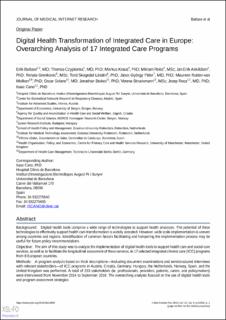| dc.description.abstract | Background: Digital health tools comprise a wide range of technologies to support health processes. The potential of these technologies to effectively support health care transformation is widely accepted. However, wide scale implementation is uneven among countries and regions. Identification of common factors facilitating and hampering the implementation process may be useful for future policy recommendations. Objective: The aim of this study was to analyze the implementation of digital health tools to support health care and social care services, as well as to facilitate the longitudinal assessment of these services, in 17 selected integrated chronic care (ICC) programs from 8 European countries. Methods: A program analysis based on thick descriptions—including document examinations and semistructured interviews with relevant stakeholders—of ICC programs in Austria, Croatia, Germany, Hungary, the Netherlands, Norway, Spain, and the United Kingdom was performed. A total of 233 stakeholders (ie, professionals, providers, patients, carers, and policymakers) were interviewed from November 2014 to September 2016. The overarching analysis focused on the use of digital health tools and program assessment strategies. Results: Supporting digital health tools are implemented in all countries, but different levels of maturity were observed among the programs. Only few ICC programs have well-established strategies for a comprehensive longitudinal assessment. There is a strong relationship between maturity of digital health and proper evaluation strategies of integrated care. Conclusions: Notwithstanding the heterogeneity of the results across countries, most programs aim to evolve toward a digital transformation of integrated care, including implementation of comprehensive assessment strategies. It is widely accepted that the evolution of digital health tools alongside clear policies toward their adoption will facilitate regional uptake and scale-up of services with embedded digital health tools. | |

